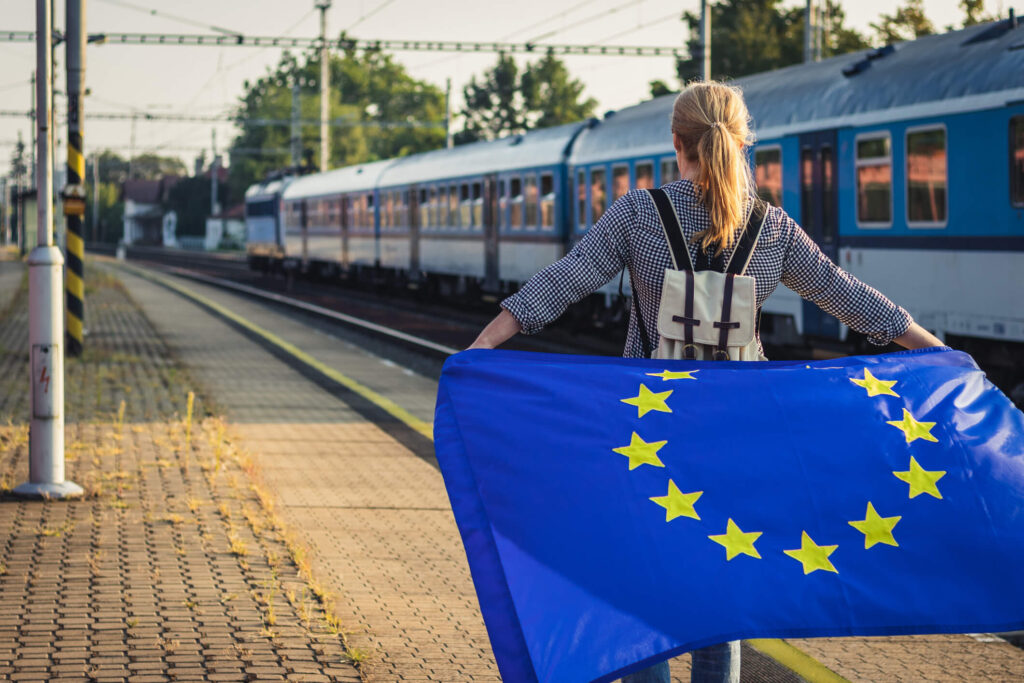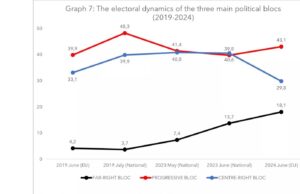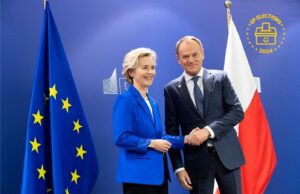As new EU accession negotiations put the need for a reform of the Treaties onto the political agenda, leaders understand enlargement to be a ‘geo-strategic investment’. Europe’s left should assume its responsibility to present an alternative vision.
Two fundamentally entangled issues
On 14 December 2023, the European Council decided unanimously to open accession negotiations with Ukraine and the Republic of Moldova. On top, Georgia was granted the status of a candidate country. While, at least on paper, the number of countries aspiring to join the EU has thus risen to ten, the accession process for the Western Balkan states is moving forward very slowly, if at all – and the already advanced negotiations with Turkey have been frozen in 2018. Whereas the European Council reaffirmed its commitment to the Western Balkans’ future accession perspective, no such comment was made towards Turkey.
For the first time since the initial enlargement of the European Communities in 1973, a whole decade went by without the accession of any country. But with Russia’s military aggression against Ukraine, the discussion about enlargement has quickly gained momentum: Only days later, the European Council met in Versailles to conclude that “Ukraine belongs to our European family”. Ukraine subsequently filled out the Questionnaire on EU membership in a record time of only 10 days and in February of 2023, Volodymyr Zelenskyy was welcomed by standing ovations in the European Parliament. Few months went by before the European Commission officially recommended the opening of negotiations with Ukraine in its annual enlargement package. A screening process to determine the country’s legislative alignment will now be carried out and should the subsequent negotiations be completed successfully, an accession treaty will be drawn up – a process that seems straightforward but can take years, if not decades, to conclude.
Less noticed, the enlargement debate’s revitalization has also given new impetus to another development simmering beneath Brussels’ surface: the Parliament’s demand to change the European Treaties. In response to the proposals of the Conference on the Future of Europe, a historically unique EU-wide undertaking in citizen participation, the Parliament has in 2022 for the first time made use of Article 48 TEU to activate the procedure for amending the Treaties. Shortly after, Ursula von der Leyen used her State of the Union address to voice also the Commission’s support for a treaty reform. Since then, the Parliament has developed a fully revised version of the European Treaties and transmitted its proposals to the Council in November of 2023.
According to Article 48 TEU, however, only the European Council has the competence to open up official deliberations on treaty changes. Due to a lack of political will by the member states, the reform process has completely stalled since then. An ever-advancing enlargement process might have just enough potential to put a dent into the prevailing scepticism: Doubts are being raised as to whether the European Union’s institutions could continue to function adequately after another round of enlargement without being reformed altogether. And at least Parliament’s answer to this question is a resounding ‘no’: Its report on treaty change considers a revision to be ‘inevitable’ in light of future enlargements.
Should this assessment be true, complicated yet crucial questions arise: What exactly would the prospect of an enlarged Union imply for the debate on constitutional reforms against the background of Russia’s invasion? And how should a socialist perspective on enlargement react to these implications? Can the Party of the European Left and the Left in the European Parliament become engines for a social perspective in this already started process?
On the Malfunctioning of the European Union
Constitutional reforms lie at the core of the preparations for policy-making in an enlarged Union. The most pressing institutional barrier to efficient EU decision-making is the Council’s necessity to vote unanimously on certain policy fields, including taxation, social security, Common Foreign and Security Policy – and the accession of new EU member states. It makes sense to take a closer look, also because the recent opening of negotiations with Ukraine nearly failed because of it.
Being adamantly opposed to further European integration, Hungary’s nationalist Prime Minister Viktor Orbán regularly uses his veto right to block processes. During the European Council’s decision on Ukraine’s accession, he infamously took a ‘constructive coffee break’ and left the room so that he would not have to vote in favour. As this allowed the other leaders to continue with their agenda and Orbán to save face, the incident has already been hailed as a potential blueprint for overcoming such a deadlock in the future. But during the exact same session, he also blocked the continuation of financial aid to Ukraine in the form of a €50 billion support package. It took two more months to reach a deal with concessions to Orbán.
The ability to withhold a vote in one policy field to exert pressure and gain room for negotiations in a completely different area has been a well-known roadblock for the EU’s ability to act. And in an enlarged Union, the difficulties would only intensify. Whereas all current candidate countries, Turkey excluded, comprise a population similar to that of the United Kingdom, their accession would without any institutional reforms bring about nine new veto powers in the Council and nine new Commissioners in the Commission. Each newly admitted country would possess the power to hinder other candidate countries from joining or to further prolong institutional reforms. Admitting new countries without treaty reform risks manoeuvring the EU into a decision-making dead end by aggravating the existing deadlock.
One possible approach to this problem, already possible under the current treaty framework, would be making use of a so-called ‘passerelle’ clause: Under Article 48 TEU, the European Council has the ability to unanimously allow the Council to vote with a qualified majority on certain matters that would usually require unanimity – deciding unanimously to not decide unanimously, so to say. Actually making use of this possibility, however, has seemingly never been in the interest of those states that would otherwise profit from their veto powers: In their current form, passerelle clauses have just never been applied.
An expert group on EU institutional reform, set up by the German and French governments, recently presented its recommendations on how to best prepare for enlargement. It concludes that “the EU is not ready yet to welcome new members” and recommends making “preparations for treaty revisions” during the upcoming legislative term. When presenting the implications for the EU institutions’ composition, it advises that “all remaining policy decisions should be transferred from unanimity to [qualified majority voting]”. Without drastic reform of the Union’s primary law, enlargement seems to be neither successfully possible nor likely.
With the current institutional set-up creating not only an unacceptable democratic gap in the Union’s decision-making process but also the ability for a far-right government to receive preferential treatment in the Council, the demand to fully abolish unanimity in preparation for enlargement seems very sensible. Unfortunately, institutional reforms could also help to lock in a path very different from the European vision that socialists uphold.
In the shadow of military escalation
Overcoming unanimity in the Council would have major consequences for one very specific policy area: the EU’s Common Security and Defence Policy (CSDP). Distilling a uniform voice on foreign and security affairs out of the interests of 27 member states has always been a major challenge for the EU. As Pauline Jäckels pointed out for Jacobin, the chaotic reactions to the recent developments in the Israel-Gaza war have exposed the inner contradictions that exist between institutions and member states alike. When Ursula von der Leyen, the Commission’s president, conducted a trip to Israel to visit the Kfar Aza kibbutz and hold a press statement with Israeli prime minister Benjamin Netanjahu, the Union’s so-called High Representative for Foreign Affairs and Security Policy, namely Josep Borrell, publicly criticised her “absolutely supportive position of Israel” adding that her trip “had a high geopolitical cost for Europe”. Conversely, von der Leyen’s line was supported by the Parliament’s president, Roberta Metsola, who also belongs to the conservative European People’s Party and even joined her during her travels. Nathalie Loiseau, chair of the Parliament’s committee on Security and Defence affairs, however, has publicly voiced her discontent, even accusing the Commission of exceeding its competences: “I don’t understand what the President of the European Commission has to do with the foreign policy of the EU, which she is not in charge of.” Adding to this confusion about the respective role of each institution, the European Council also struggled to form a position, as stark differences between member states prevail. Closed-door deliberations took over five hours and were held with a ban on mobile phones in the room, as leaders grappled over semantic subtleties.
In comparison, the EU’s swift reaction to the events of the 24th of February has been perceived as a moment of historic unity. Within hours of Russia’s invasion, the European Council agreed on sanctions and eight additional sanctions packages would follow within the year 2022 alone. But whereas general agreement on the support of Ukraine still exists over two years later, the exact path forward now also regularly ends up being subject of public disputes between leaders. While Germany’s government has decided against the delivery of Taurus cruise missiles to Ukraine in order to not become too directly involved in combat operations, France’s Macron has recently reaffirmed his position on the possibility of even sending ground troops. And in another clear contrast to the initial unity, the recent negotiations on the Ukraine Facility did not go as smoothly due to Orbán making use of Hungary’s veto power.
The discussion about treaty changes in the context of enlargement therefore also needs to be seen in the context of an increasingly visible drive for an integration of the European defence capabilities and extraordinarily high military spendings in the member states. At the beginning of her tenure, von der Leyen announced her intentions to shape a “geopolitical Commission”. In line with her public goal of a more coordinated EU defence spending and as a foretaste of her next term in office, the Commission has recently presented plans on how to strengthen the European Defence Industry. Similarly, the Parliament’s proposals for changes to the Treaties called for “the establishment of a defence union including military units, a permanent rapid deployment capacity, under the operational command of the Union” as well as “a dedicated budget” for the “joint procurement and the development of armaments”. In a recent report, the Parliament goes into detail about the reforms that are needed from the EU’s side to prepare for enlargement. And while the report includes many sensible demands, such as the adherence to a merit-based approach and the involvement of civil society, it also primarily understands enlargement to be “one of the strongest […] geopolitical tools”. By likewise calling it a “geo-strategic investment”, it is fully in line with the European Council, which two months prior has used the same term in its own conclusions.
This attitude towards enlargement follows a misguided approach to security. As Axel Ruppert has recently put it in a text for Metapolis: “The EU should focus its global ambitions on addressing the three biggest threats that humanity is facing: destruction through nuclear war, the loss of biodiversity and the climate crisis. None of these security risks will be solved with more weapons.” According to the Parliament’s report, enlargement would in fact “contribute to peace, stability, security, democracy, unity, the fight against climate change, as well as, ensuring prosperity and well-being on the European continent”. But such sweeping claims need proper backing. Current political discourse is based on the assumption that no country involved in a full-out military conflict would be granted full EU membership, implying that the enlargement process could only be realised in the context of an end to Russia’s war of aggression. But in the current political debates, granting Ukraine full membership prevails over the necessity to end the war. So far, the EU has not been able to formulate a strategy on how to combine its support of Ukraine’s right to self-defence with the introduction of diplomatic steps that actively contribute to ending the war. And while the continuous risk of a nuclear escalation or the introduction of an economy of war looms over the continent, the enlargement process is at risk of being exploited: Should the Treaties be opened to prepare the Union’s institutional framework for enlargement, articles related to the EU’s Common Security and Defence Policy will not remain untouched. And using enlargement as an instrument to pursue the goal of a militarised CFSP and CSDP will eventually undermine not only the legitimate accession efforts of the candidate countries’ citizens but also the socio-economic potential that an accession could bring for future member states.
An alternative: Enlargement beyond geopolitics
In 2023, according to several nation-wide polls, between 78% and 92% of all Ukrainians felt positively about joining the EU – among them many workers and socialists. An accession to the EU is associated not only with security guarantees, but also the prospect of better living conditions – including strengthened workers’ rights and rule of law, higher social standards, better access to decent work, less corruption and more political freedoms. Being well aware of the austerity measures anchored in the Treaties, socialists are rightfully cautious when the advantages of EU membership are being glorified. But such expectations arise from the lived realities in the applying membership countries. They are legitimate and they need to be taken seriously.
In a recent article for Jacobin, Anna Jikhareva points out how Ukrainian leftists and labour unions already use Brussels and the EU’s Charter of Fundamental Rights as a strategic reference point. Title IV of the Charter anchors several workers’ rights in primary law, including the right to collective bargaining and strike action (Article 28), the right to fair and just working conditions (Article 31), as well as the right to protection in the event of unjustified dismissal (Article 30). With the Ukrainian government using Russia’s invasion as an excuse to weaken trade unions and roll back workers rights, a framework under EU primary law would open up much more leeway for political opposition and labour struggles against such measures.
The resulting dilemma is apparent: While it is important to respond to the legitimate accession efforts and hopes of candidate countries, the EU’s continuing militarisation needs to be opposed. Radical change to that trajectory can only be caused by a wide-scale political movement, able to put pressure on European governments through labour struggles and legislative wins – but European left-wing parties are currently not able to instigate such a degree of mobilisation. To convince workers and voters that they are nonetheless able to deal with the contradictions that the European Union exposes them to, the European Left should offer an alternative enlargement procedure that builds on improving people’s material living conditions.
With comprehensive treaty changes on the agenda, such a proposal would need to go beyond institutional reforms and instead reimagine the very axioms that EU policy is made upon – including the EU’s cruel border regime and the lack of democratic control about the European Central Bank’s mandate. But in regard to enlargement, such a proposal would need to directly link the accession procedure with an increased standard of living for both current and future EU citizens. Anchoring the European Pillar of Social Rights and a Social Progress Protocol, as proposed by the European Trade Union Confederation (ETUC), in EU primary law would be crucial. Similarly, the accession countries need to be equipped with the resources necessary to play their role in the organisation of a Just Transition. Therefore, increasing the EU’s financial support towards regions with carbon intensive industries through a revision of the EU’s cohesion policies would be needed. And whereas it would make sense to move towards qualified majority voting in the Council for most issues – to hinder the blockage of progressive tax policy, for example – unanimity should be kept on all defence related matters.
Granting candidate status and starting accession negotiations will always evoke great expectations among citizens. An EU-wide dialogue and more opportunities for the involvement of citizens in decision-making processes are indispensable for grounding these institutional challenges in the public consciousness of our societies. But while citizen participation and a transparent negotiation process can help to respond accordingly, they are not enough to fulfil the hope that people’s lives will materially and politically change for the better. It is not ensured that the enlargement process will be successful, but without lasting peace on the European continent it is doomed to fail.
The European Left must not only involve itself in the process but also work towards a broader debate on this matter, so that the respective political stakeholders can be forced to take responsibility: the Parliament, the Commission, the Committee of the Regions, the European Economic and Social Committee and especially the European Political Parties. Mainly, however, the member states need to move.
The life’s work of Altiero Spinelli – and especially the “Manifesto of Ventotene” – should remind us that when working towards a transnational cooperation of states and peoples, radical ideas need to go hand in hand with concrete undertakings. As the European Union might be on the verge of radical change, it is definitely worth fighting for a Union that goes beyond the institutional framing of the single market and an enlargement beyond geopolitics.
Cover Image: Zbynek Pospisil – iStock by Getty Images.



